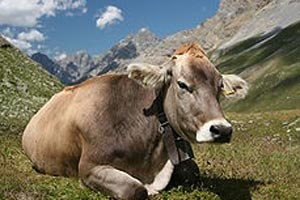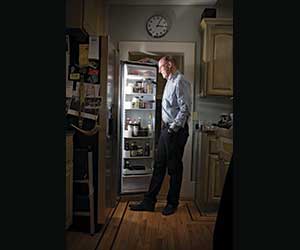
Illustration: Jason Schneider
Carrin Flores is a cattle rancher’s fantasy come true: An attractive 26-year-old with stylish eyeglasses and glossy lipstick, she’s unabashed about her love of cows. “They are so cute. Their cute little tongues. Oh, and their eyelashes,” she says. “But I also friggin’ love to eat them.” She cooks beef four nights a week and can list dozens of ways she likes it: T-bone, tri-tip, boneless rump roast…Flores, a graduate student in veterinary medicine at Washington State University-Pullman, plans to work in the beef industry when she finishes. But she’s already a graduate of the Masters of Beef Advocacy (MBA), an industry-funded program that trains college students to fight back against critics of big agribusiness, like Michael Pollan.
“Pollan,” Flores tells me over beers at Dupus Boomer’s, a campus bar, “is really our enemy right now.” More than 35,000 college students were assigned one of his books last year; The Omnivore’s Dilemma is one of the most widely read titles on US campuses. Flores and her fellow big beef advocates hope to counter that. “In the future,” she says, “we’re the ones who are going to tell you about your beef.”
Since its launch in March 2009, the MBA has trained nearly 3,000 students and farmers to spread the “positive beef message,” offering online lessons on how to combat PETA and organizing a Twitter and Facebook “Food Fight” against its “campus critics.” Daren Williams, the communications director for the National Cattlemen’s Beef Association, helped start the MBA with $240,000 from the Beef Checkoff program, the beef industry’s PR wing. He says the MBA’s “focus has really become young people on the big land-grant campuses,” from which more than one-fifth of future farmers and industry leaders will emerge.
The MBA is just one part of a pro-beef backlash on campus. In May 2009, Washington State’s president canceled a lecture by Pollan, citing budget cuts, and pulled The Omnivore’s Dilemma from the freshman reading list. (The talk was rescheduled when a wealthy supporter stepped in to pay Pollan’s way.) That September, when Pollan was asked to speak at California Polytechnic State University in San Luis Obispo, the owner of Harris Ranch—a stockyard critics have dubbed “Cowschwitz”—threatened to withhold (PDF) a $500,000 donation to the school. Campus officials turned the speech into a panel featuring a proponent of conventional beef. This was followed by a dustup at the University of Wisconsin-Madison, where Pollan’s In Defense of Food was distributed to incoming students, angering local ag groups, which bused in farmers to protest a speech by the author.
“Some of what you are hearing is organic, grassroots debate—they have different opinions about agriculture and beef production—and that’s good for a democracy,” says Pollan, who teaches journalism at the University of California-Berkeley (where I was his student). Yet he’s wary of the interests behind the campaign, noting that a PR firm funded by McDonald’s reportedly urged elementary schools not to let Fast Food Nation author Eric Schlosser speak to kids.
Asked if the MBA is just a phony PR campaign for Big Ag, Flores is emphatic: “We’re not Astroturf. We’re just worried about our futures in agriculture.” The dozen or so MBA grads and young farmers I spoke to shared similar anxieties. “We know the environment is in crisis and we don’t want to contribute to that,” says Crystal Young, a recent graduate of Kansas State University, where she received degrees in animal science and journalism. “But we’re also farmers, so the hard thing for us is to take into account all the criticisms of conventional agriculture, and to also continue to feed the world on the scale we are doing now. I think a lot of young people are primarily worried they won’t be able to have a career in farming at all in the future.”
And therein lies the irony of the MBA: The concerns that have prompted Flores and her peers to get organized are the same ones that have catapulted Pollan to such acclaim. The next generation of farmers realizes that the days of oil-fueled, corn-fed, resource-intensive agriculture are numbered. Beef consumption is the lowest it’s been since 1961. Just 8 percent (PDF) of the nation’s farmers are under 35.
“Things are changing—half of my family are vegetarians,” Flores says. We’ve just watched Pollan speak to a gym of 3,500 or so cheering fans and a handful of fuming, pink-cheeked cowboys. “Pollan was really impressive up there,” she tells me, finishing her beer. “But I can’t escape the fact that, ultimately, his message is that we’re unsustainable.”











